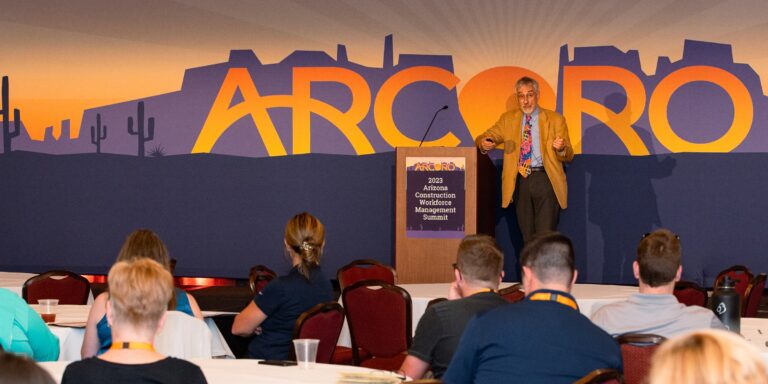As workforce management issues go, retention is a big one for the construction industry. Not only are there not enough workers to go around, but it can also cost a lot to keep the people you’ve got. And sometimes, even if you pay top dollar, employees leave anyway.
Technology can enable construction companies to do more with the same or fewer resources but people are still at the core of the industry. From the back office to the job site, it’s the employees who are irreplaceable.
That’s why culture was top of mind for many of the attendees at Arcoro’s inaugural workforce management summit in Arizona on October 3. For this event we gathered representatives from companies, industry associations and technology partners for a day of networking, brainstorming and learning.
Employers told us that retaining their workforce is important, and they see culture as a key part of their retention strategy.
But culture isn’t a cure-all. Some companies have what they perceive is a strong culture but it’s not really inclusive. For example, does culture extend to people in the field or is it focused on your office staff—or vice versa? Do women feel like the culture applies and appeals to them? Are people of color represented and included?
Culture doesn’t have to be monolithic, but it does need to be relevant. Without a set of values and expectations and positive experiences that can be appreciated by everyone, culture doesn’t do much to drive retention. It might help keep those who feel part of the culture but it could potentially make it easier for others to leave when they don’t feel respected or part of the fold.
Here’s a not-so-real-life example.
Say a company gets everyone together for an optional monthly karaoke event. There are some people who love karaoke and can’t wait to participate. It’s the highlight of their month. But karaoke isn’t everyone’s idea of a good time, and some may even dislike it. Those people either attend and feel awkward or they opt not to come. Either way, karaoke doesn’t appeal to them so it has a net zero impact on their loyalty. They may even feel like they’re not being included, which is the opposite of what strong culture does.
In these challenging times when construction employees are hard to recruit and retain, a company culture that includes most employees isn’t enough. If your culture appeals to 80% of your workforce, that leaves 20% out in the cold and without a compelling reason to stay—other than pay.
And that can get expensive. Creating and maintaining a culture that’s strong and inclusive is much more sustainable and less expensive than constantly opening your proverbial checkbook for raises or bonuses.
The keynote of our workforce summit focused on the importance of culture for construction and contracting companies, and attendees got some valuable tips and insights to take back to their own organizations. Plus they got to ask questions of industry experts and compare notes with peers at other companies.
Want to learn more about some of the components of a strong company culture for construction? Read our blog.
And if you’re interested in workforce management issues for construction and how to address today’s biggest challenges, join us for next year’s summit. Let us know you’re interested and we’ll keep you in the loop.
Join us next year!




